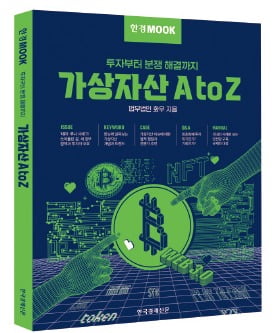On the 17th, the Korea Economic Daily published MOOC (irregular publication) 《Virtual assets A to Z, from investment to dispute resolution》 (photo), which contains everything about virtual assets. This is Hankyung’s 25th mook.
The cryptocurrency market is going through a harsh winter. The Terra Luna crisis, in which 58 trillion won in market capitalization evaporated, amplified distrust in virtual assets as a whole beyond algorithm-based stablecoins. With explosive inflation, the Federal Reserve raising interest rates, and the possibility of a recession, the global virtual asset market has fallen into a situation of extreme fear.
According to CoinMarketCap, the world's virtual asset market cap is 1234 trillion won (as of the 16th). The total number of domestic users who have accounts with virtual asset operators is 15.25 million, and the number of users participating in actual transactions is 5.58 million. Considering the MZ generation who is enthusiastic about investing in cryptocurrency and non-fungible tokens (NFT), companies that have entered the virtual asset business, and the government’s enactment of the Basic Act on Virtual Assets, virtual assets have already become an integral part of our society, economy, and life.
The problem is that it is not easy to find verified information about such important virtual assets. Fragmentary information is scattered, but it is very difficult to grasp the overall context of virtual assets and various issues at a glance.
It is against this background that the Korea Economic Daily published 《Virtual assets A to Z, from investment to dispute resolution》. This book systematically contains △basic concepts and trends that should not be missed in the era of virtual assets △legal issues by field that investors and operators should know △the impact of virtual asset technology on each industry. In particular, various technologies, products, and services leading virtual assets such as blockchain, coin, token, NFT, metaverse, and DeFi were viewed from a legal perspective for the first time in Korea, and a three-dimensional effect was added.
There are already various disputes related to cryptocurrency and NFT, such as price manipulation, use of undisclosed information, and infringement of intellectual property rights. This means that anyone can be a party to a dispute in a newly emerging market. This book contains legal interpretations of various crime and dispute issues, such as cryptocurrency multi-level fraud and money laundering, so that you can prepare for the 'what if'. Attorneys from Hwawoo Law Firm, a leading law firm in Korea, participated in the writing and strengthened their expertise.

